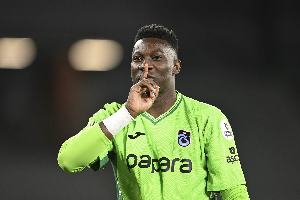It was R.L. Stevenson who said in Treasure Island that “dead men don’t bite”. The adage has been over-used to render it a cliché because of the growing number of people who die daily around the world.
But when the national chairman of the SCNC, Chief Ayamba Ottun, 91, was to be interred in Mamfe last weekend, it appeared as though the Yaounde authorities were afraid the old man could get up and inflict some fatal teeth on the Biya regime.
One eye-witness report says on “July 26, 2014, all the vehicles entering Mamfe from the Bamenda or Kumba end were stopped and thoroughly searched. Anyone found with any writing or programme or flag of Southern Cameroons was brought down, made to sit on the tarmac and later transferred to an unknown destination. Over three lorries loaded to the brim, full of heavily-armed police and soldiers were on stand-by.
At the mortuary, there were mixed troops of police, soldiers and gendarmes guarding the area from the road to the hospital and beyond. As the corpse left the mortuary, five police, gendarme and BIR vehicles, loaded with heavily-armed men followed.”
Why deploy that number of security operatives to accompany a harmless corpse in rural Eyumojock when Cameroon is fighting a “war” with the Boko Haram terrorists who have kidnapped people, among them wife of a vice prime minister and take to Nigeria?
Did the exhibition of brawl scared the overwhelming crowd at the burial? Does such mobilisation and deployment of security agents not just over-rate a fragmented SCNC? Didn’t the security men know their massive presence only gave the burial ceremony some official connotation? It instead was counterproductive, giving the SCNC a super power we doubt it has.
To unswerving SCNC activists, Ayamba had a befitting burial, thanks to the security mobilization. Even after the bizarre incident, the police impounded the casket that was being flown in from the US!
The traditional ruler of Onaku village in the Eyumojock sub-division in Mamfe first showed his bravery at his old age when he accompanied Justice Frederick Alobwede Ebong, James Sabum and some members of the Southern Cameroons Youth League (SCYL) to storm CRTV Buea.
There at the wee hour of December 31, 1999, they “proclaimed the independence of Southern Cameroons”. They were arrested and detained in Yaounde for 18 months without trial or charged before being released. Shortly after their freedom, Martin Ngeka Luma, then national chairman of the SCNC, died and was replaced by Chief Ayamba.
Ayamba took the SCNC to an optimistic dimension never before achieved by his predecessors. It was during his tenure that the Yaounde authorities were taken to the African Commission and Anglophones recognised as “a people”.
He presented an address on the Anglophone problem at the United Nations Human Rights Commission and another at the European Union Parliament in 2006. It was still under his leadership that the SCNC got admission into the Unrepresented Nations and Peoples Organization in 2006. Several members of the group which is opposed to using violence to attain its objectives have had their independence. Ayamba also obtained membership of the SCNC into the Trans-National Radical Party in Italy. He pushed the SCNC case to the point that executed former Libyan leader, Col. Muammar Gaddafi almost presented its issue of independence at the African Union.
His most scintillating achievement however remains the Africa Commission decision which recognised Anglophones as “a people” which is different from a tribe or clan. The commission however lacked jurisdiction to grant its request for independence but most importantly called for dialogue between the SCNC and the Yaounde regime.
The ruling also recommended that the SCNC could form a political party to use it to present its grievances. This recommendation of forming a political party which is what the regime has laid prominence on does not go well for the SCNC given the minority status of Anglophones as a whole.
But even if they had to transform into a political party, wasn’t it still necessary that the Biya regime should sit down and talk with their SCNC compatriots? President Biya has earned kudos in the central African sub-region for being a shrewd negotiator and man of peace.
That has been illustrated in the peaceful manner with which he handled the Bakassi conflict with Nigeria. Cameroon’s dexterity in negotiating with the Boko Haram terrorists on at least four cases for the release of hostages has also been commendable not only in Cameroon but abroad.
If the regime can succeed in dialogue with a hard-hitting alien and devilish group like Boko Haram, what stops the Yaounde regime from a brotherly dialogue with the SCNC whose trust lies in the “force of argument and not the argument of force”?
One of the reasons the government often gives for not having dialogue with the SCNC is that the group is in factions so the genuine leader is not known. If that was truly the case, the passage of Chief Ayamba to glory has ushered in a new renaissance, unity and invigorated impetus.
The challenge is now for the SCNC officials and activists to bury the acrimonious hatchet and elect a new leader who should be presented to the Yaounde authorities and the world sooner than later. The responsibility will then be that of Yaounde to initiate dialogue so that the type of unnecessary mobilisation used to escort a harmless corpse will not repeat itself in future.
In that way, The Guardian Post believes, we will all consolidate national unity to intensify the “war” against Boko Haram and other vices that pose a threat to peace.
Actualités of Saturday, 2 August 2014
Source: The Guardian Post
“Dead men don’t bite”: the case of Chief Ayamba's burial













